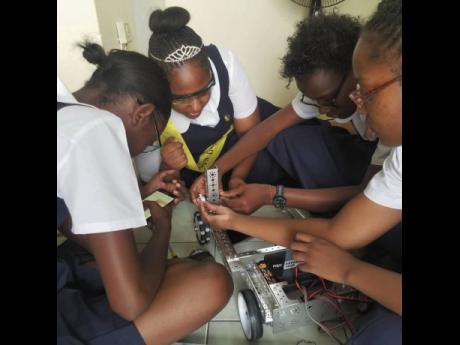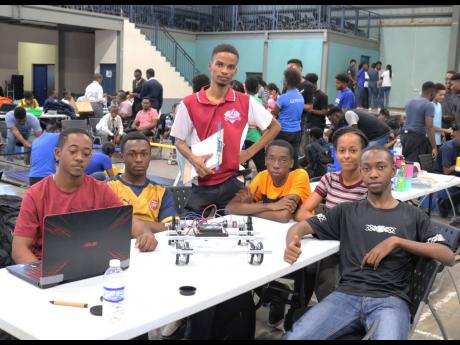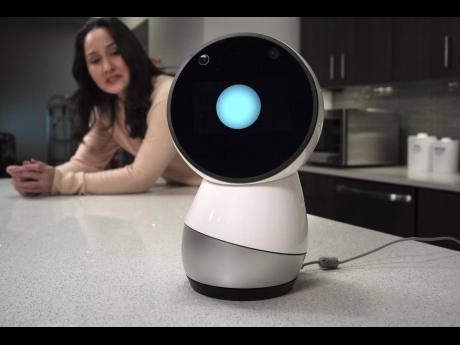STEM careers and robotics
Self-navigating vehicles, intelligent networks, machine-to-machine learning, robotics, artificial intelligence, cryptocurrencies and a host of other technological breakthroughs, once considered farfetched, are revolutionising careers and businesses all over the world.
The days when robotics was a thing of the future of science fiction are long gone; robotics is very much a scientific fact in 2020. This digital revolution, or the Fourth Industrial Revolution, is charting the pathway for future generations.
Jamaica, like the rest of the world, understands the importance of a technologically enabled society and prioritises this in its vision 2030 Development Plan.
To accomplish this goal, the Government of Jamaica has declared its focus on proponents of STEM education (science, technology, engineering, and math) in schools. Globally, “both private and public sectors report that 21st-century workers require skills that many of today’s graduates don’t have. Students need more in-depth knowledge of math and science, plus the ability to integrate and apply that knowledge to solve the challenges facing our nation. Children who study STEM also develop a variety of skills that are essential for success: critical thinking and problem solving, creativity and innovation, communication, collaboration, and entrepreneurship, to name a few.
The age-old concern of robots taking over jobs of humans still exists, but rather than focus on that idea, students should consider the different career fields that will open up as we prepare for this revolution.
Becoming popular
Science and robotics clubs are becoming popular in schools such as Jamaica College, Kingston College, Dunoon Park Technical, Calabar High, Merl Grove High, Convent of Mercy (Alpha) Academy, St Andrew Technical High, Ardenne High School, Pembroke Hall High School, The Queen’s High School, and St Jago in St Catherine.
Founder of First Tech Jamaica Robotics Gavin Samuels says the number of teams entering the First Tech Robotics Challenge 2020 has increased from 14 to 30. He shares that over 50 schools across the Caribbean are engaging students through robotics clubs, and he is objective is to convert the interest from club level to competition, allowing students exposure to innovation in the area.
The growth in popularity of robotics in schools augers well for the STEM initiative as applied knowledge leads to deeper learning, and this is what the clubs and competitions allow. Robotics is doing what STEM is meant to do: “to integrate and apply knowledge of math and science in order to create technologies and solutions for real-world problems, using an engineering design approach”.
So what are some potential careers for students of robotics?
- Mechanical engineers – design and create mechanical devices, including robots
- Aerospace engineering and operations technicians – program advanced robotics equipment
- Electro-mechanical technicians – specialise in working with robots and other equipment that is operated remotely such as drones
- Sales engineers – sell scientific and technical equipment to companies, including robotics equipment
- Computer and information research scientists – find ways to use technology more effectively or create new technological tools such as computer programming languages
- Computer programmers – write the code for programs designed to operate robotics equipment
Source: https://study.com/robotics_career.html
Dynamic field
Robotics is a dynamic field, and students engaged in the field are excited about the possibilities for their future. The platform is empowering them to use their creativity and apply science and technology to bring forth solutions for tomorrow’s problems. The World Economic Forum states:
Artificial Intelligence (AI) is a key driver of the Fourth Industrial Revolution. Its effect can be seen in homes, businesses, and even public spaces. In its embodied form of robots, it will soon be driving cars, stocking warehouses, and caring for the young and elderly. AI holds the promise of solving some of society’s most pressing issues.
For Jamaica to be ready for this “Fourth Industrial Revolution”, the Government of Jamaica signals its readiness with the announcement of its STEM education initiative as part of its National Development Plan – Vision 2030. Robotics in schools will certainly help to boost the programme as research shows there are many benefits to robotics education:
- Robotics skills feed into math and science and allow children to develop a genuine interest in how the world works. They are so caught up in the creativity and excitement that classrooms often don’t allow.
- Robotics clubs show students that despite being challenging sometimes, math, engineering, and science are not scary,
- Robotics clubs help children develop tolerance and camaraderie while working as teams.
- Robotics Clubs improve students tech-savvy communication skills when applied in coding sessions.
Research also shows that children who are involved in robotics clubs show major improvement in their classwork. Unfortunately, starting a robotics programme in schools require investment, and some schools may not be able to afford it immediately, and private-public partnership may be necessary to expand robotics clubs in schools across the island. First Tech Challenge 2020 will certainly add STEAM to the conversation.





